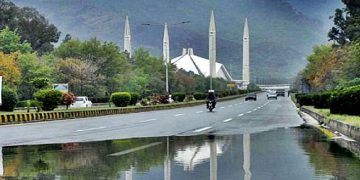Zubair Qureshi
Air pollution is a silent public health emergency in Pakistan and kills over 128,000 people annually due to air pollution related illnesses.
Pakistan is one of the top three countries after China and India accounting for highest deaths due to ambient air pollution (smog).
Commemorating the International day of clean air for blue skies, Fair Finance Pakistan has launched an online campaign on Twitter to raise public awareness and to facilitate actions to improve air quality in the country.
Asim Jaffry, country programme lead, Fair Finance Pakistan in his message said, “There is a need to change the business model in Pakistan and elsewhere to ensure that business operations exercise responsibility specially the financial sector to ensure net zero carbon footprints, protect human life and the planet’s ecology.”
Pakistan is the country with the highest number of pollution related deaths in the East Mediterranean Region.
Millions of people in Pakistan are forced to breathe air that contains high levels of hazardous pollutants and particulate matter such as carbon monoxide, methane, nitrogen dioxide and sulfur dioxide.
Preventable and premature deaths occur largely from strokes, heart disease, lung cancer and acute respiratory infections due to an increase in the air pollutants over the years.
He further said the Clean Air Day aims to raise awareness on the importance of clean air for health, for human economies and demonstrates the close link of air quality to other environmental and developmental challenges such as climate change. “This day also emphasizes the need to strengthen international cooperation to improve air quality including collection and utilization of data, joint research and sharing best practices with specific focus on the disproportionate affect of poor air quality on women, children and older persons,” he said.
The third International Day of Clean Air for blue skies is celebrated globally on September 7 2022. This year’s theme ‘The Air We Share’ focuses on the transboundary nature of air pollution and highlights collective actions to reverse the effects of air pollution.
World Air Quality Index 2021 ranked Pakistan as the third most air polluted country in the world and cities like Lahore, Faisalabad and Peshawar are amongst top 15 most polluted cities in the country. Fair Finance Pakistan highlights air pollution and climate change are closely linked as all major pollutants have an impact on the climate and most share common sources with greenhouse gases. As one of the countries on the frontline of the climate crisis, Pakistan faces grave consequences in failing to address climate change resulting in increasing frequency, intensity and duration of adverse weather events including extreme temperatures, droughts and flooding.
The Twitter campaign calls on the policy circles, commercial banks, businesses and civil society to promote responsible investments in the country, promote sustainable transport, just transition towards renewable energy, crop and waste management, monitor air pollution, implement laws and deliver credible plans to reduce emissions from vehicles, power plants, construction and industry. It builds on latest Intergovernmental Panel on Climate Change (IPCC) report recommendations for reduction in emissions of methane, black carbon, and ground-level ozone alongside carbon dioxide to foster sustainable development by delivering better health, agricultural, economic and climate outcomes through improved air quality.
According to the World Health Organisation’s new guidelines, 99% of the world’s population is now breathing polluted air. Seven million people die each year due to air pollution, with 90% of them in low- and middle-income countries.
United Nations Environment Programme (UNEP) research shows air pollution knows no national borders and is strongly correlated to other global crisis such as climate change, biodiversity loss, other forms of pollution, social and gender parity as well as economic development. The UN agency estimates when people are exposed to air pollution and extreme heat, their risk of death is 20 percent higher.
Evidence show dirty air hits the poor the most and disproportionately affects the most vulnerable, such as women, children and the elderly. The World Bank reports one in every 10 people exposed to unsafe air pollution live in extreme poverty. Low- and middle-income countries account for 80% of people exposed to unsafe air pollutants indicating inequality gap widening between rich and poor nations.













